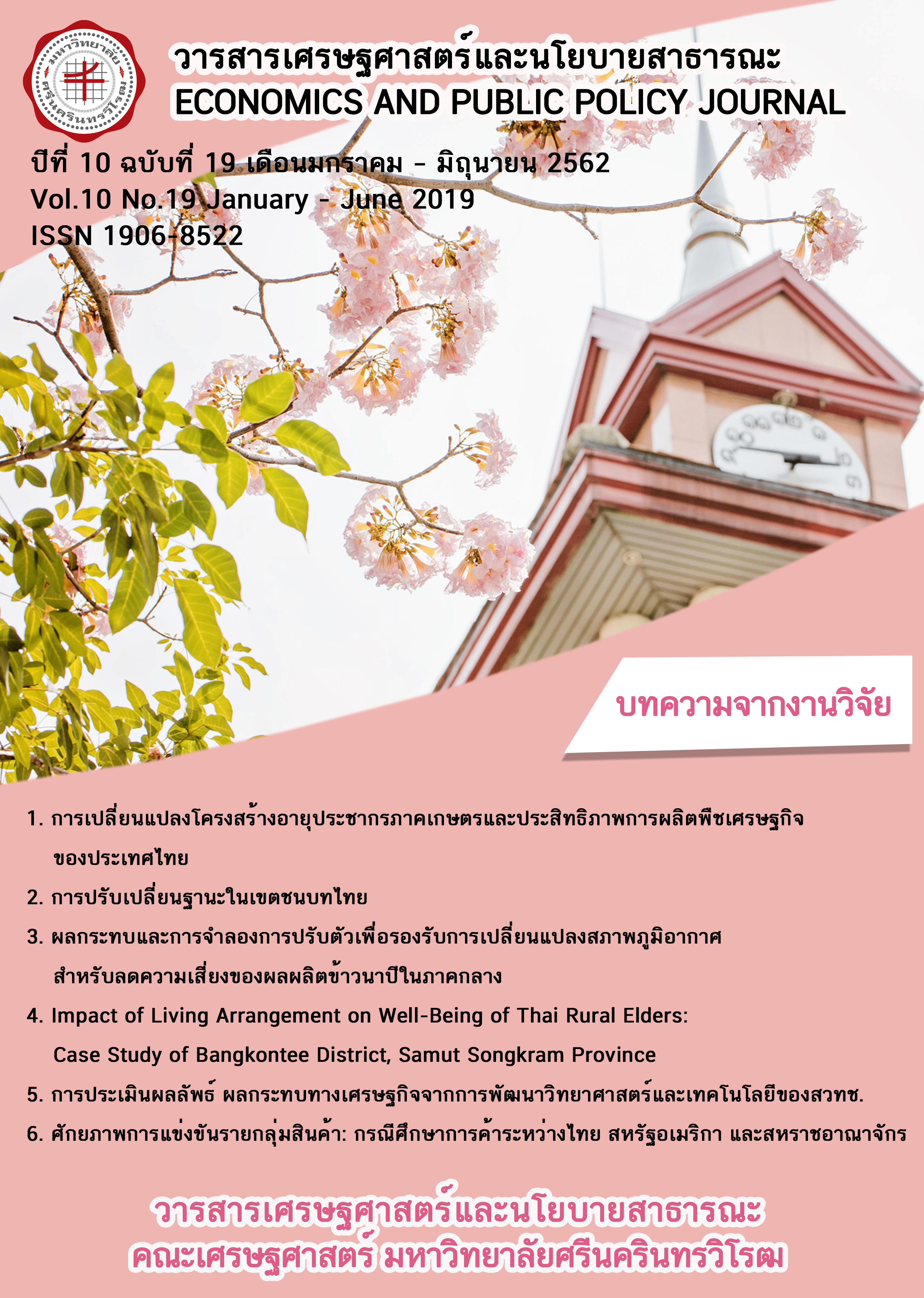Impact of Living Arrangement on Well-Being of Thai Rural Elders: Case Study of Bangkontee District, Samut Songkram Province
Main Article Content
บทคัดย่อ
Thailand is facing aging society under the circumstances where the perspective of caring for older persons by the family is different from the past. The mobility of socio-economic condition has put profound impact on the well-being of older persons when their adult children are not the main caregivers for the older parents. The objective of this research was to identify the pattern of living arrangement and its impact on well-being of rural elders. The research was based on field survey with Thai citizens 60 years and older in Bangkontee district, Samut Songkram province. Random sampling was utilized to select 76 respondents for analyzing data regarding demographic profile, living arrangement, and quality of life indicators. Social scaling technique was used to quantify qualitative data and the impact of the living arrangement was analyzed using t-test statistical evaluation. The findings indicated that living arrangement had significant impact on the health and financial condition of the rural elders. Older persons living along had less satisfaction for health well-being significantly (p-value 0.045). In addition, older persons living with family member gained higher satisfaction for financial well-being (p-value 0.020). Policy recommendations include supporting local government to establish financial security for the elderly regularly and promoting elderly values within the family institutions.
Article Details
สงวนลิขสิทธิ์ © 2553 คณะเศรษฐศาสตร์ มหาวิทยาลัยศรีนครินทรวิโรฒ
คณะเศรษฐศาสตร์ มหาวิทยาลัยศรีนครินทรวิโรฒ จัดพิมพ์วารสารเศรษฐศาสตร์และนโยบายสาธารณะ เพื่อเผยแพร่บทความวิชาการทางเศรษฐศาสตร์ นโยบายสารธารณะ และสาขาอื่นๆที่เกี่ยวข้อง ทัศนะและข้อคิดเห็นใดๆ ที่ปรากฏในวารสารเป็นความคิดเห็นส่วนตัวของผู้เขียน โดยบทความที่ได้รับการตอบรับจะถือเป็นลิขสิทธิ์ของคณะเศรษฐศาสตร์ มหาวิทยาลัยศรีนครินทรวิโรฒ
บรรณาธิการ อาจารย์ ดร.พลพัธน์ โคตรจรัส
เอกสารอ้างอิง
Bengtson, V. L., & Putney, N. M. (2006). Future Conflicts across Generations and Cohorts. In J. A. Vincent, C. Phillipson & M. Downs (Eds.), The Futures of Old age (pp. 20-29). London: Sage Publications.
Bongaarts, J., & Zimmer, Z. (2002). Living Arrangements of Older Adults in the Developing World: An Analysis of Demographic and Health Survey Household Surveys. The Journal of Gerontology Series B Psychological Sciences and Social Sciences, 57(3), 145-157.
Carney, D. (1999). Approaches to Sustainable Livelihoods for the Rural Poor. London: Department for International Development.
Chen, F., & Short, S. E. (2008). Household Context and Subjective Well-Being among the Oldest Old in China. Journal of Family Issues, 29(10), 1379-1403.
Cherlin, A. J. (1999). Going to Extremes: Family Structure, Children's Well-Being and Social Science. Demography, 36(4), 421-428.
Knodel, J., & Chayovan, N. (2008). Population Ageing and the Well-being of Older Persons in Thailand. Ann Arbor, MI: University of Michigan.
Knodel, J., & Saengtienchai, C. (2005). Rural Parents with Urban Children: Social and Economic Implications of Migration on the Rural Elderly in Thailand (Research report). Ann Arbor, MI: University of Michigan. Retrieved from https://pdfs.semanticscholar.org/c399/9c06809e82eeef3a237a11ec374ac412f2a3.pdf
Mehta, K. K. (2006). A Critical Review of Singapore's Policies Aimed at Supporting Family Caring for Older Members. Journal of Aging and Social Policy, 18(3-4), 43-57.
NESDB. (2016). Population and Income Statistical Database: Bangkok: Ministry of Prime Minister.
National Statistical Office. (2010). Population Census. Bangkok: Ministry of Information and Communication Technology.
National Statistical Office. (2016). Older Persons in Thailand In Ministry of Information and Communication Technology (Ed.). Bangkok, Thailand: National Statistical Office.
Prasartkul, P. (2010). Low Fertility Rate in Thailand [Brochure]. Bangkok: Population and Development Newsletter.
Sodei, T. (2004). Families in North-East Asia. Geriatrics Gerontology International, 4(s1), 98-100.
Tsuno, N., & Homma, A. (2009). Ageing in Asia -The Japan Experience. Ageing International, 34(1-2), 1-14. Retrieved from https://link.springer.com/article/10.1007/s12126-009-9032-9
United Nations. (2015). World Population Ageing. New York: United Nations. Retrieved from http://www.un.org/en/development/desa/population/publications/pdf/ageing/WPA2015_Report.pdf
Vincent, J. A., Phillipson, C., & Downs, M. (2006). The Futures of Old Age. London: Sage Publications.
Westley, S.B. (1998). Asia's Next Challenge: Caring for theElderly.Asia-Pacific Population Policy,45, 1-4.
White, S. C. (2015). Wellbeing and Quality of Life Assessment. Rugby, UK: Practical Action Publishing.
World Health Organization. (1998). WHOQOL User Manual. Geneva: World Health Organization.


